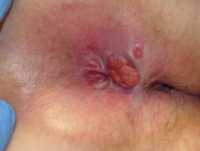
20 Nov Anal Cancer Rates Rise Sharply
MedicalResearch.com Interview with:
Ashish Deshmukh, PhD, MPH
Assistant Professor
UTHealth School of Public Health
Houston
MedicalResearch.com: What is the background for this study?
Response: Anal cancer is one of the six human papillomavirus associated cancers. Rates of anal cancer are increasing in the US, but no prior study quantified the contemporary trends (i.e., increase in rates over time) in anal cancer incidence. It was unknown whether the rise is real or driven by increased screening in some high-risk populations. Incidence trends according to age and stage at diagnosis was also never comprehensively studied. Furthermore, it was unknown whether the rise in incidence has led to a rise in mortality. Our objective was to answer these questions.
MedicalResearch.com: What are the main findings?
Response: We found that anal cancer rates are have risen very rapidly (i.e., 2.7% per year increase) between 2001 and 2015 in the US with notable rise in White women and Black men. The increase in White women aged 50-79 years old was particularly striking (over 5% year). To understand trends according to birth cohort, we used a quantitative tool called “age-period-cohort modeling” that revealed that a 5 fivefold increase occurred among Black millennials (those born after 1980s), and the rise doubled among White women born after 1960s. We observed a similar (3.1% per year) increase in anal cancer mortality, which is very concerning.
MedicalResearch.com: What should readers take away from your report? Would more HPV vaccinations help reduce the risk of anal cancer?
Response: HPV vaccination has great potential to prevent future burden of anal cancer. Sadly, vaccination rates continue to remain low (only 50% coverage nationally), and as we recently found over 75% Americans don’t know that HPV causes anal cancer. To reduce vaccine hesitancy and selectivity, it is imperative to spread the word that HPV vaccination is a cancer prevention vaccine that prevents six cancers in boys and girls and it should be our utmost priority to rapidly scale up HPV vaccination coverage both among boys and girls as it will prevent over 40,000 cancers every year in the US.
Although we do not have national anal cancer screening recommendations, anal cytology test and digital anorectal examination is recommended for HIV infected persons. Organ transplant recipients and women with history of cervical, vaginal, and vulvar disease should also discuss with their health care professional to get anal examination (anal cytology or digital anorectal examination) as these tests have great potential to both prevent and early detect anal cancer.
MedicalResearch.com: What recommendations do you have for future research as a result of this work?
Response: Understanding the reasons for these increases would be important, particularly among women.
Disclosure: Dr. Deshmukh consulted Merck on unrelated projects.
Citation:
Ashish A Deshmukh et al. Recent trends in squamous cell carcinoma of the anus incidence and mortality in the United States, 2001-2015, JNCI: Journal of the National Cancer Institute (2019). DOI: 10.1093/jnci/djz219
JOIN OUR EMAIL LIST
[mailpoet_form id="5"]We respect your privacy and will never share your details.
Last Modified: [last-modified]
The information on MedicalResearch.com is provided for educational purposes only, and is in no way intended to diagnose, cure, or treat any medical or other condition. Always seek the advice of your physician or other qualified health and ask your doctor any questions you may have regarding a medical condition. In addition to all other limitations and disclaimers in this agreement, service provider and its third party providers disclaim any liability or loss in connection with the content provided on this website.
Last Updated on November 20, 2019 by Marie Benz MD FAAD

